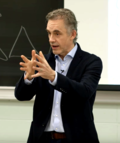Jordan Peterson
Jordan Bernt Peterson (born June 12, 1962) is a Canadian clinical psychologist and a retired professor of psychology at University of Toronto.[1] He studies abnormal, social, and personality psychology. He is interested in the psychology of religious and ideological belief.[4] His views are generally described as conservative.[5][dubious ]
Jordan Peterson | |
|---|---|
 Peterson in Dallas, Texas, in June 2018 | |
| Born | Jordan Bernt Peterson 12 June 1962 (aged 63) Edmonton, Alberta, Canada |
| Education | University of Alberta (BA) McGill University (MA, PhD) |
| Children | 2 |
| Scientific career | |
| Fields | Psychology |
| Institutions |
|
| Thesis | Potential psychological markers for the predisposition to alcoholism (1991) |
| Influences | |
| Website | jordanbpeterson |
| Signature | |
 | |
Views
Peterson criticises political correctness,[6] Marxism,[7] and postmodernism.[8] He said:[9][10]
Most of the global warming posturing is a masquerade for anti-capitalists to have a go at the Western patriarchy. That’s partly why the climate change thing for me is a contentious issue because you can’t trust the players." However, he believes climate change to be an issue.
When interviewing young American conservative figure Brett Cooper, Peterson claimed:[11]
The Left ‒ especially the radical types ‒ will drop you in a moment if you say or do anything that is out of that ideological sake [sic] [. ...] they will cancel or exclude. That's part of the entanglement of the radical left with cluster B psychopathology, with narcissism, with psychopathy, with borderline personality disorder, with antisocial behavior. That's all [...] passive-aggressive behavior, because it doesn't involve fists but social exclusion ‒ a very effective form of punishment.
Selected publications
Books
- Maps of Meaning: The Architecture of Belief (1999)
- 12 Rules for Life: An Antidote to Chaos (2018)
- Beyond Order: 12 More Rules for Life (2021)
Papers
- Self-Deception Explained
- You can neither remember nor forget what you do not understand
- Complexity Management Theory: Motivation for Ideological Rigidity and Social Conflict
- Play and the Regulation of Aggression
- Three Forms of Meaning and the Management of Complexity
- The Functional Neuroanatomy and Psychopharmacology of Predatory and Defensive Aggression
- Peacemaking among higher-order primates
- Neuropsychology of Motivation for Group Aggression and Mythology
Movies
- The Rise of Jordan Peterson (2019)[12]
- No Safe Spaces (2019)[13]
Jordan Peterson Media
Peterson at the University of Toronto in March 2017
Peterson speaking in front of St. Stephen's Basilica, Budapest, Hungary, in May 2019
References
- ↑ 1.0 1.1 "Jordan B Peterson". ResearchGate. Archived from the original on 12 November 2017. Retrieved 11 November 2017.
- ↑ Jordan Peterson (1999). "Preface: Descensus ad Infernos". Maps of Meaning. Routledge. p. xvii. ISBN 978-0415922227.
I read something by Carl Jung, at about this time, that helped me understand what I was experiencing. It was Jung who formulated the concept of persona: the mask that "feigned individuality." Adoption of such a mask, according to Jung, allowed each of us- and those around us - to believe that we were authentic. Jung said...
- ↑ Jordan Peterson (1999). "Preface: Descensus ad Infernos". Maps of Meaning. Routledge. pp. xiii, xiv. ISBN 978-0415922227.
- ↑ Tucker, Jason; VandenBeukel, Jason (December 1, 2016). "'We're teaching university students lies' – An interview with Dr Jordan Peterson". C2C Journal. http://www.c2cjournal.ca/2016/12/were-teaching-university-students-lies-an-interview-with-dr-jordan-peterson/.
- ↑ https://www.vox.com/world/2018/3/26/17144166/jordan-peterson-12-rules-for-life.
{{cite web}}: Missing or empty|title=(help) - ↑ "Jordan Peterson: The right to be politically incorrect". National Post. November 8, 2016. Retrieved December 27, 2018.
- ↑ "Jordan Peterson, the obscure Canadian psychologist turned right-wing celebrity, explained". Vox. May 21, 2018. Retrieved December 27, 2018.
- ↑ "Postmodernism: definition and critique (with a few comments on its relationship with Marxism)". Jordan B. Peterson.
- ↑ Marsh, Sarah (2019-03-20). "Cambridge University rescinds Jordan Peterson invitation" (in en-GB). The Guardian. . https://www.theguardian.com/education/2019/mar/20/cambridge-university-rescinds-jordan-peterson-invitation. Retrieved 2019-06-04.
- ↑ Callaghan, Greg (April 20, 2018). "Right-winger? Not me, says alt-right darling Jordan Peterson". The Sydney Morning Herald. Retrieved August 2, 2018.
- ↑ "An Alternative Walk of Fame | Brett Cooper | EP 448". YouTube. May 13, 2024. Retrieved April 17, 2025.
- ↑ "'The Rise of Jordan Peterson'—A Review". October 14, 2019.
- ↑ "No Safe Spaces exposes the madness of groupthink". Washington Examiner. November 4, 2019.
Other websites
| Wikimedia Commons has media related to Lua error in Module:Commons_link at line 62: attempt to index field 'wikibase' (a nil value).. |




